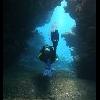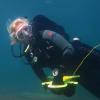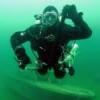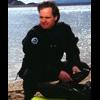Well, I agree with most of what has been said.
It will definately help to have your own kit. That way you are not struggling to relearn and gain comfort in a new BCD each time.
I do not agree with the position that training should be left for later. It is much better to master the skills the first time and up front than allow yourself to develop bad habits that have to be relearned later when you go to fix it. It is always more difficult to relearn an old skill that you mastered badly rather than just mastering it the correct way from the beginning.
The PPB course can be an excellent and one of the most valuable courses out there if run the correct way. You have to look for an instructor that is really going to build up the course for you and use things like video analysis to help you. Video taping is a hugely valuable tool, especially for buoyancy control work. It allows you to see what you were feeling.
Buoyancy control is the defining skill in scuba. So, it is worth your concern and question on it.
I think that everyone in diving could benefit from working on buoyancy. Few are as good as they believe they are.
You want to shoot for a flat level position in the water as you swim and if hovering motionless. This will take adjusting weights, equipment, swim techniques and breathing. This is what I call working postion. You will want to master several different kicking techniques to have on demand for different environmental needs. Also, work on hovering in different positions and adjusting position with breath control and fins only.
Stop using your hands to do any kind of moment underwater, if you were.
Find an instructor that is willing to work with you in the pool or very shallow water. This is something that should be done in every open water class out there, but unfortunately because of the value instructors get out of teaching open water they simply rarely if ever spend the needed time on this. Work in four feet of water. Swim in this shallow area until you can swim in a good level position without using your hands to position or turn, without contacting the surface or the bottom. Three feet of water is even better. Work on doing this breathing in different ways. Work on it with different kick styles. Make sure you have an good instructor to help with learning good technique from the beginning.
Once you feel you have got it, take your mask off and do it all again with your eyes closed. Sometimes this actually makes it easier for people. Keep working in the shallow end till you can do all this and some other activities while staying level and not touching the bottom or the surface. It is much harder than you can imagine.
Once you have mastered this, you will be much better at buoyancy control. Then, move and repeat the process in different levels of the deep end. Work on hovering motionless in different positons and add doing things while you do that.
Buoyancy does take at least a good thirty hours of diving to really become second nature. You can excellerate the process by doing work like this. The goal is to have nothing happen on a dive with you that is not controlled or conscious. There are no mistakes. It is not the easiest way to go about learning to dive, but once mastered it will make you better much faster. It will free you up to concentrate on just enjoying the dive and being able to do things while diving rather than managing the dive itself.
Breathing is critical. It is the real control. Deep slow breathing is a good start at the basic concept, but does not illustrate the full complexity of breathing well for scuba. I would suggest taking a good freediving clinic if you want to work on breathing. They only have one breath to do what they need to do, so you know the ones they use before they hold their breath are going to be good ones.
http://www.performancefreediving.com/ is a great course to take. One of the best experiences I have ever had. Physiology and awareness of hydrodynamics will also translate to your scuba diving.
Anyway, I like to say you want to imagine that you are filling you lungs from the bottom and emptying them from the top. It is important to understand that 70% of your gas exchange occurs in the lower one third of your lungs. Most people breath out of the top of their lungs. Even while scuba diving, very few really pull gas into the depths of their lungs.
You want to initiate your breathing with your diaphram. Let it drop down and stick out alot. Not the sexiest thing, but really good for breathing well. This can take some practice to master. Once your lungs are half full you add your chest to the inhaltion. Once at a comfortable full breath, pause for two seconds. This is a relaxed pause, not holding your breath. If depth were to change your airway would open and relieve any increase in pressure.
Then, slowly exhale from the top of the lungs through pursed lips or a tongue on the roof of your mouth or restriction of your soft pallate. The idea is to keep the volume up in your lower lungs for the longest time possible. The exhalation will take some time. When done well, you will not need to breath more than four to six times a minute even under heavy exercision. It is the optimum way to breath for scuba. The average experienced diver that masters this gains 20 to 40% increase in gas duration compared to before.
This whole area is what I call breathing parameter. Once you have mastered the ideal breathing parameter, you can change it up depending on your needs. If you wanted to rise in the water column you would exhale even slow than usual. If you wanted to fall you would exhale faster than usual. This can be adjusted further by changing the pace on your inhalation. If you want to stay motionless at a hover you would maintain a more neutral lung voume at all times by not fully exhaling or inhaling.
Breathing is key once you know where neutral is at. You can use the breathing control to help with problems before they are problems. If you are getting buoyant and you are not quick to your deflator, give a good big full exhale to stop or slow the ascent to give you the added time to get the gas out of the BCD. If you see yourself about to crash into the bottom give a quick big breath and slowly release it to allow you to slow or stop your descent into the bottom and have time to adjust your bcd.
The goal behind all of this is to be able to move near the bottom with minimal impact on the bottom or yourself while having the confidence that you know you are in control at all times. The cool thing is that if you spend the time early in your diving career to master this, it all becomes automatic. Then, you do not really have to think about it much.
Ideally, you are adding gas to the BCD on the way down and only touching it to let out the gas as it expands as you make your way back up. All the other adjustments are done with breathing as was mentioned in earlier posts. Rememeber that adjustments take time to take effect.
We all start this process as unconscious incompetents (we don't what we do not know), we evolve to conscious incompetents (hopefully, knowing that we do not know) to finally work toward becoming a unconscious competents (Not having to think about it and being able to do it automatically). The important thing is that we arrive at UC doing the correct things unconsciously. The curve to relearn once you are at that level is painful and long.
Hope that helps. Sorry for the long post.
Grant






















